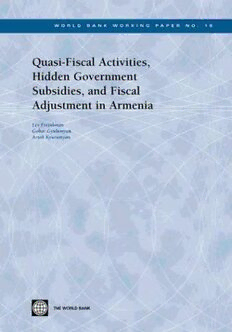
Quasi-Fiscal Activities, Hidden Government Subsidies, and Fiscal Adjustment in Armenia (World Bank Working Papers) PDF
61 Pages·2003·0.326 MB·English
Most books are stored in the elastic cloud where traffic is expensive. For this reason, we have a limit on daily download.
Preview Quasi-Fiscal Activities, Hidden Government Subsidies, and Fiscal Adjustment in Armenia (World Bank Working Papers)
Description:
This paper analyzes quasi-fiscal deficits and subsidies, and their impact on Armenia's fiscal performance in the second part of the 1990s. In addition, it discusses the specific features of quasi-fiscal financing in transition economies. Estimates of Armenia's actuarial and hidden deficits in the second part of the 1990s shows that its deficits were relatively modest compared to similar economies. While these deficits remain, they have declined recently, becoming the main source of fiscal adjustment in Armenia. This study also presents a comprehensive picture of subsidization in Armenia, including hidden and quasi-fiscal subsidies that were a primary cause of the hidden deficit. The paper shows the ultimate sources and main beneficiaries of these subsidies. It concludes that the main distortive impact of quasi-fiscal subsidies is on social policy, not on enterprise restructuring and private sector performance.
See more
The list of books you might like
Most books are stored in the elastic cloud where traffic is expensive. For this reason, we have a limit on daily download.
